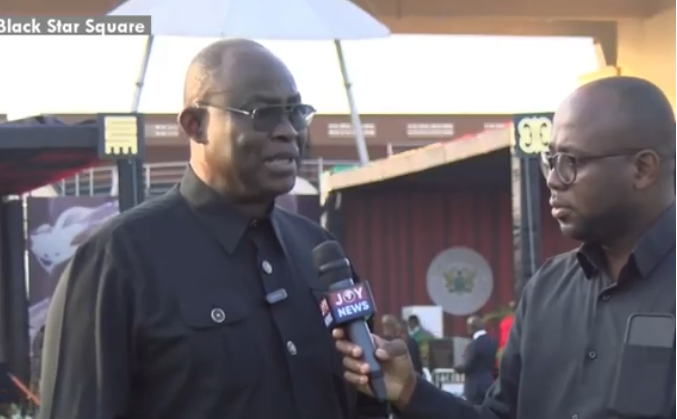Former Minister of Trade and Industry Ekwow Spio-Garbrah has paid glowing tribute to the late Nana Konadu Agyeman-Rawlings, describing her as an indomitable force in Ghana’s political and social history whose legacy will endure for generations.
Speaking in remembrance of the former First Lady at the state burial on Friday, November 28, Spio-Garbrah said the day was one “of memories, of great things that have passed, and of great things still ahead for Ghana,” emphasising that Nana Konadu’s imprint on the nation remains unmistakable.
He recalled that a pastor at the Ridge Church had only days earlier described her as “the Yaa Asantewaa of Ghana’s politics.” According to him, this description was no coincidence, noting that she even named one of her own daughters Yaa Asantewaa to reflect the mission she embraced—to be a fighter, a warrior, and a brave woman who stood firmly for the underprivileged, especially women.
Spio-Garbrah highlighted her role in founding the 31st December Women’s Movement, which he said did incredible things across the country.
Although the DWM was considered a kind of women’s wing of the NDC, he stressed that its primary purpose was self-help, women’s advocacy, and empowerment, training women in basket weaving, beekeeping, agriculture, and other productive work that made them economically independent. “That is what Nana Konadu stood for,” he said.
He also reflected on the difficulties the movement faced after the NDC lost the 2000 elections, saying the organisation was targeted by the NPP at the time “for destruction,” and that to a large extent those efforts succeeded in physically dismantling it.
He noted that more than 11 state entities—including the BNI, CID, CHRAJ, regional ministers, district assemblies, and DCEs—investigated the movement in an attempt to weaken and cripple it.
During this period, Nana Konadu invited him to serve as an adviser because the movement was facing immense frustration and pressure at the district and regional levels.
Spio-Garbrah recounted his personal connection with the Rawlingses, noting that they had all attended Achimota School, with Rawlings two years ahead of him, as was President Rawlings. The two were classmates, and that was how they met, fell in love, and later married. He said those who went to school with them followed their story—their successes, challenges, and progress—closely.
He said their bond deepened in 1994, when he was appointed Ghana’s Ambassador to the United States. During his tenure, he organised an eight-city, ten-day tour of the country for President and Mrs. Rawlings, during which Nana Konadu stayed at the ambassador’s residence with her staff. He said they travelled together across several American cities, sharing conversations, laughter, and moments of camaraderie that strengthened their close personal connection.
Through all these experiences, Spio-Garbrah said, one thing remained clear:
Nana Konadu Agyeman-Rawlings was a determined, courageous, and purposeful woman whose work for women and for Ghana will never be forgotten.
READ ALSO:
- As a mother, you were our protector, confidant and friend – Children of Nana Konadu pay tribute
- 15-year-old boy found dead in Krachi Nchumuru in suspected suicide
- Grandchildren hail Nana Konadu as their hero in emotional funeral tribute
- Family hails Nana Konadu Agyeman-Rawlings as courageous daughter and role model


